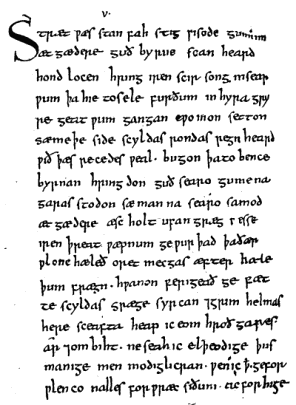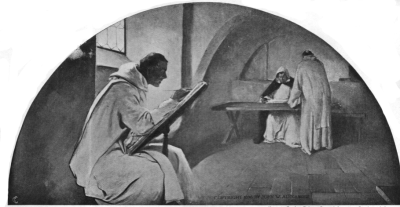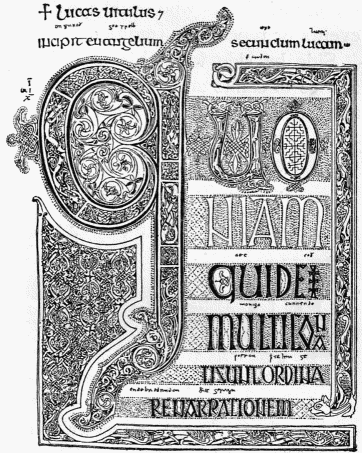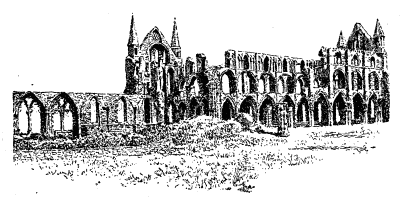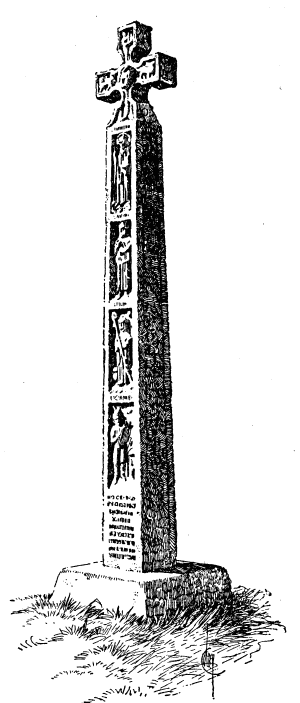
Adapted from English Literature Its History and Its Significance for the Life of the English Speaking World by William J. Long
THE ANGLO-SAXON OR OLD-ENGLISH PERIOD (450-1050)
OUR FIRST POETRY
Beowulf. Here is the story of Beowulf, the earliest and the greatest epic, or heroic poem, in our literature. It begins with a prologue, which is not an essential part of the story, but which we review gladly for the sake of the splendid poetical conception that produced Scyld, king of the Spear Danes. [2]
At a time when the Spear Danes were without a king, a ship came sailing into their harbor. It was filled with treasures and weapons of war; and in the midst of these warlike things was a baby sleeping. No man sailed the ship; it came of itself, bringing the child, whose name was Scyld.
Now Scyld grew and became a mighty warrior, and led the Spear Danes for many years, and was their king. When his son Beowulf [3] had become strong and wise enough to rule, then Wyrd (Fate), who speaks but once to any man, came and stood at hand; and it was time for Scyld to go. This is how they buried him:
Then Scyld departed, at word of Wyrd spoken,
The hero to go to the home of the gods.
Sadly they bore him to brink of the ocean,
Comrades, still heeding his word of command.
There rode in the harbor the prince's ship, ready,
With prow curving proudly and shining sails set.
Shipward they bore him, their hero beloved;
The mighty they laid at the foot of the mast.
Treasures were there from far and near gathered,
Byrnies of battle, armor and swords;
Never a keel sailed out of a harbor
So splendidly tricked with the trappings of war.
They heaped on his bosom a hoard of bright jewels
To fare with him forth on the flood's great breast.
No less gift they gave than the Unknown provided,
When alone, as a child, he came in from the mere.
High o'er his head waved a bright golden standard--
Now let the waves bear their wealth to the holm.
Sad-souled they gave back its gift to the ocean,
Mournful their mood as he sailed out to sea. [4]
"And no man," says the poet, "neither counselor nor hero, can tell who received that lading."
One of Scyld's descendants was Hrothgar, king of the Danes; and with him the story of our Beowulf begins. Hrothgar in his old age had built near the sea a mead hall called Heorot, the most splendid hall in the whole world, where the king and his thanes gathered nightly to feast and to listen to the songs of his gleemen. One night, as they were all sleeping, a frightful monster, Grendel, broke into the hall, killed thirty of the sleeping warriors, and carried off their bodies to devour them in his lair under the sea. The appalling visit was speedily repeated, and fear and death reigned in the great hall. The warriors fought at first; but fled when they discovered that no weapon could harm the monster. Heorot was left deserted and silent. For twelve winters Grendel's horrible raids continued, and joy was changed to mourning among the Spear Danes.
At last the rumor of Grendel crossed over the sea to the land of the Geats, where a young hero dwelt in the house of his uncle, King Hygelac. Beowulf was his name, a man of immense strength and courage, and a mighty swimmer who had developed his powers fighting the "nickers," whales, walruses and seals, in the icebound northern ocean. When he heard the story, Beowulf was stirred to go and fight the monster and free the Danes, who were his father's friends.
With fourteen companions he crosses the sea. There is an excellent bit of ocean poetry here (ll. 210-224), and we get a vivid idea of the hospitality of a brave people by following the poet's description of Beowulf's meeting with King Hrothgar and Queen Wealhtheow, and of the joy and feasting and story-telling in Heorot. The picture of Wealhtheow passing the mead cup to the warriors with her own hand is a noble one, and plainly indicates the reverence paid by these strong men to their wives and mothers. Night comes on; the fear of Grendel is again upon the Danes, and all withdraw after the king has warned Beowulf of the frightful danger of sleeping in the hall. But Beowulf lies down with his warriors, saying proudly that, since weapons will not avail against the monster, he will grapple with him bare handed and trust to a warrior's strength.
Forth from the fens, from the misty moorlands,
Grendel came gliding--God's wrath [5] he bore--
Came under clouds, until he saw clearly,
Glittering with gold plates, the mead hall of men.
Down fell the door, though fastened with fire bands;
Open it sprang at the stroke of his paw.
Swollen with rage burst in the bale-bringer;
Flamed in his eyes a fierce light, likest fire. [6]
At the sight of men again sleeping in the hall, Grendel laughs in his heart, thinking of his feast. He seizes the nearest sleeper, crushes his "bone case" with a bite, tears him limb from limb, and swallows him. Then he creeps to the couch of Beowulf and stretches out a claw, only to find it clutched in a grip of steel. A sudden terror strikes the monster's heart. He roars, struggles, tries to jerk his arm free; but Beowulf leaps to his feet and grapples his enemy bare handed. To and fro they surge. Tables are overturned; golden benches ripped from their fastenings; the whole building quakes, and only its iron bands keep it from falling to pieces. Beowulf's companions are on their feet now, hacking vainly at the monster with swords and battle-axes, adding their shouts to the crashing of furniture and the howling "war song" of Grendel. Outside in the town the Danes stand shivering at the uproar. Slowly the monster struggles to the door, dragging Beowulf, whose fingers crack with the strain, but who never relaxes his first grip. Suddenly a wide wound opens in the monster's side; the sinews snap; the whole arm is wrenched off at the shoulder; and Grendel escapes shrieking across the moor, and plunges into the sea to die.
Beowulf first exults in his night's work; then he hangs the huge arm with its terrible claws from a cross-beam over the king's seat, as one would hang up a bear's skin after a hunt. At daylight came the Danes; and all day long, in the intervals of singing, story-telling, speech making, and gift giving, they return to wonder at the mighty "grip of Grendel" and to rejoice in Beowulf's victory.
When night falls a great feast is spread in Heorot, and the Danes sleep once more in the great hall. At midnight comes another monster, a horrible, half-human creature,[7] mother of Grendel, raging to avenge her offspring. She thunders at the door; the Danes leap up and grasp their weapons; but the monster enters, seizes Aeschere, who is friend and adviser of the king, and rushes away with him over the fens.
The old scenes of sorrow are reviewed in the morning; but Beowulf says simply:
Sorrow not, wise man. It is better for each
That his friend he avenge than that he mourn much.
Each of us shall the end await
Of worldly life: let him who may gain
Honor ere death. That is for a warrior,
When he is dead, afterwards best.
Arise, kingdom's guardian! Let us quickly go
To view the track of Grendel's kinsman.
I promise it thee: he will not escape,
Nor in earth's bosom, nor in mountain-wood,
Nor in ocean's depths, go where he will. [8]
Then he girds himself for the new fight and follows the track of the second enemy across the fens. Here is Hrothgar's description of the place where live the monsters, "spirits of elsewhere," as he calls them:
They inhabit
The dim land that gives shelter to the wolf,
The windy headlands, perilous fen paths,
Where, under mountain mist, the stream flows down
And floods the ground. Not far hence, but a mile,
The mere stands, over which hang death-chill groves,
A wood fast-rooted overshades the flood;
There every night a ghastly miracle
Is seen, fire in the water. No man knows,
Not the most wise, the bottom of that mere.
The firm-horned heath-stalker, the hart, when pressed,
Wearied by hounds, and hunted from afar,
Will rather die of thirst upon its bank
Than bend his head to it. It is unholy.
Dark to the clouds its yeasty waves mount up
When wind stirs hateful tempest, till the air
Grows dreary, and the heavens pour down tears. [9]
Beowulf plunges into the horrible place, while his companions wait for him oh the shore. For a long time he sinks through the flood; then, as he reaches bottom, Grendel's mother rushes out upon him and drags him into a cave, where sea monsters swarm at him from behind and gnash his armor with their tusks. The edge of his sword is turned with the mighty blow he deals the merewif; but it harms not the monster. Casting the weapon aside, he grips her and tries to hurl her down, while her claws and teeth clash upon his corslet but cannot penetrate the steel rings. She throws her bulk upon him, crushes him down, draws a short sword and plunges it at him; but again his splendid byrnie saves him. He is wearied now, and oppressed. Suddenly, as his eye sweeps the cave, he catches sight of a magic sword, made by the giants long ago, too heavy for warriors to wield. Struggling up he seizes the weapon, whirls it and brings down a crashing blow upon the monster's neck. It smashes through the ring bones; the merewif falls, and the fight is won.
The cave is full of treasures; but Beowulf heeds them not, for near him lies Grendel, dead from the wound received the previous night. Again Beowulf swings the great sword and strikes off his enemy's head; and lo, as the venomous blood touches the sword blade, the steel melts like ice before the fire, and only the hilt is left in Beowulf's hand. Taking the hilt and the head, the hero enters the ocean and mounts up to the shore.
Only his own faithful band were waiting there; for the Danes, seeing the ocean bubble with fresh blood, thought it was all over with the hero and had gone home. And there they were, mourning in Heorot, when Beowulf returned with the monstrous head of Grendel carried on a spear shaft by four of his stoutest followers.
In the last part of the poem there is another great fight. Beowulf is now an old man; he has reigned for fifty years, beloved by all his people. He has overcome every enemy but one, a fire dragon keeping watch over an enormous treasure hidden among the mountains. One day a wanderer stumbles upon the enchanted cave and, entering, takes a jeweled cup while the firedrake sleeps heavily. That same night the dragon, in a frightful rage, belching forth fire and smoke, rushes down upon the nearest villages, leaving a trail of death and terror behind him.
Again Beowulf goes forth to champion his people. As he approaches the dragon's cave, he has a presentiment that death lurks within:
Sat on the headland there the warrior king;
Farewell he said to hearth-companions true,
The gold-friend of the Geats; his mind was sad,
Death-ready, restless. And Wyrd was drawing nigh,
Who now must meet and touch the aged man,
To seek the treasure that his soul had saved
And separate his body from his life. [10]
There is a flash of illumination, like that which comes to a dying man, in which his mind runs back over his long life and sees something of profound meaning in the elemental sorrow moving side by side with magnificent courage. Then follows the fight with the firedrake, in which Beowulf, wrapped in fire and smoke, is helped by the heroism of Wiglaf, one of his companions. The dragon is slain, but the fire has entered Beowulf's lungs and he knows that Wyrd is at hand. This is his thought, while Wiglaf removes his battered armor:
"One deep regret I have: that to a son
I may not give the armor I have worn,
To bear it after me. For fifty years
I ruled these people well, and not a king
Of those who dwell around me, dared oppress
Or meet me with his hosts. At home I waited
For the time that Wyrd controls. Mine own I kept,
Nor quarrels sought, nor ever falsely swore.
Now, wounded sore, I wait for joy to come." [11]
He sends Wiglaf into the firedrake's cave, who finds it filled with rare treasures and, most wonderful of all, a golden banner from which light proceeds and illumines all the darkness. But Wiglaf cares little for the treasures; his mind is full of his dying chief. He fills his hands with costly ornaments and hurries to throw them at his hero's feet. The old man looks with sorrow at the gold, thanks the "Lord of all" that by death he has gained more riches for his people, and tells his faithful thane how his body shall be burned on the Whale ness, or headland:
"My life is well paid for this hoard; and now
Care for the people's needs. I may no more
Be with them. Bid the warriors raise a barrow
After the burning, on the ness by the sea,
On Hronesness, which shall rise high and be
For a remembrance to my people. Seafarers
Who from afar over the mists of waters
Drive foamy keels may call it Beowulf's Mount
Hereafter." Then the hero from his neck
Put off a golden collar; to his thane,
To the young warrior, gave it with his helm,
Armlet and corslet; bade him use them well.
"Thou art the last Waegmunding of our race,
For fate has swept my kinsmen all away.
Earls in their strength are to their Maker gone,
And I must follow them."[12]
Beowulf was still living when Wiglaf sent a messenger hurriedly to his people; when they came they found him dead, and the huge dragon dead on the sand beside him.
Then the Goth's people reared a mighty pile
With shields and armour hung, as he had asked,
And in the midst the warriors laid their lord,
Lamenting. Then the warriors on the mount
Kindled a mighty bale fire; the smoke rose
Black from the Swedish pine, the sound of flame
Mingled with sound of weeping; ... while smoke
Spread over heaven. Then upon the hill
The people of the Weders wrought a mound,
High, broad, and to be seen far out at sea.
In ten days they had built and walled it in
As the wise thought most worthy; placed in it
Rings, jewels, other treasures from the hoard.
They left the riches, golden joy of earls,
In dust, for earth to hold; where yet it lies,
Useless as ever. Then about the mound
The warriors rode, and raised a mournful song
For their dead king; exalted his brave deeds,
Holding it fit men honour their liege lord,
Praise him and love him when his soul is fled.
Thus the [Geat's] people, sharers of his hearth,
Mourned their chief's fall, praised him, of kings, of men
The mildest and the kindest, and to all
His people gentlest, yearning for their praise. [13]
One is tempted to linger over the details of the magnificent ending: the unselfish heroism of Beowulf, the great prototype of King Alfred; the generous grief of his people, ignoring gold and jewels in the thought of the greater treasure they had lost; the memorial mound on the low cliff, which would cause every returning mariner to steer a straight course to harbor in the remembrance of his dead hero; and the pure poetry which marks every noble line. But the epic is great enough and simple enough to speak for itself. Search the literatures of the world, and you will find no other such picture of a brave man's death.
History and Meaning of Beowulf
Concerning the history of Beowulf a whole library has been written, and scholars still differ too radically for us to express a positive judgment. This much, however, is clear,--that there existed, at the time the poem was composed, various northern legends of Beowa, a half-divine hero, and the monster Grendel. The latter has been interpreted in various ways,--sometimes as a bear, and again as the malaria of the marsh lands. For those interested in symbols the simplest interpretation of these myths is to regard Beowulf's successive fights with the three dragons as the overcoming, first, of the overwhelming danger of the sea, which was beaten back by the dykes; second, the conquering of the sea itself, when men learned to sail upon it; and third, the conflict with the hostile forces of nature, which are overcome at last by man's indomitable will and perseverance.
All this is purely mythical; but there are historical incidents to reckon with. About the year 520 a certain northern chief, called by the chronicler Chochilaicus (who is generally identified with the Hygelac of the epic), led a huge plundering expedition up the Rhine. After a succession of battles he was overcome by the Franks, but--and now we enter a legendary region once more--not until a gigantic nephew of Hygelac had performed heroic feats of valor, and had saved the remnants of the host by a marvelous feat of swimming. The majority of scholars now hold that these historical events and personages were celebrated in the epic; but some still assert that the events which gave a foundation for Beowulf occurred wholly on English soil, where the poem itself was undoubtedly written.
Poetical Form
The rhythm of Beowulf and indeed of all our earliest poetry depended upon accent and alliteration; that is, the beginning of two or more words in the same line with the same sound or letter. The lines were made up of two short halves, separated by a pause. No rime was used; but a musical effect was produced by giving each half line two strongly accented syllables. Each full line, therefore, had four accents, three of which (i.e. two in the first half, and one in the second) usually began with the same sound or letter. The musical effect was heightened by the harp with which the gleeman accompanied his singing.. The poetical form will be seen clearly in the following selection from the wonderfully realistic description of the fens haunted by Grendel. It will need only one or two readings aloud to show that many of these strange-looking words are practically the same as those we still use, though many of the vowel sounds were pronounced differently by our ancestors.
... Hie dygel lond
Warigeath, wulf-hleothu, windige næssas,
Frecne fen-gelad, thær fyrgen-stream
Under næssa genipu nither gewiteth,
Flod under foldan. Nis thæt feor heonon,
Mil-gemearces, thaet se mere standeth,
Ofer thæm hongiath hrinde bearwas
... They (a) darksome land
Ward (inhabit), wolf cliffs, windy nesses,
Frightful fen paths where mountain stream
Under nesses' mists nether (downward) wanders,
A flood under earth. It is not far hence,
By mile measure, that the mere stands,
Over which hang rimy groves.
